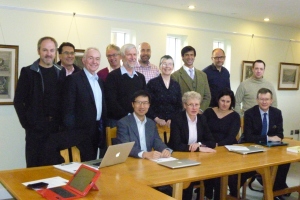European donors 'profiting from aid budgets' with high-interest loans
European Network on Debt and Development blames problem on ambiguous international rules and calls for urgent reform
Claire Provost theguardian.com, Thursday 16 January 2014 18.17 GMT
European donors have been accused of profiting from their aid budgets, as an increasing amount of their money for the world's poorest countries is being given as loans – which have to be paid back with interest.
As budgets tighten, some EU states are using "ambiguous and outdated" international rules on what can count as official development assistance (ODA) to include high-interest loans to developing countries in their annual aid figures, said the European Network on Debt and Development (Eurodad).
Jeroen Kwakkenbos, policy and advocacy officer at Eurodad, said the rules needed urgent reform to prevent donors from counting loans with "usurious" conditions as aid. "Some European governments are interpreting vague aid rules as a licence to scale up profit-making loans under the guise of development co-operation," he said.
In
a report published on Thursday, Eurodad said developing countries face interest payments of almost €600m (£499.8m) a year on these loans to
Europe. Demanding developing countries spend large amounts of money repaying loans can reduce resources for health and education for desperately poor people, it warned.
The development assistance committee (DAC) of the Organisation for Economic Co-operation and Development (
OECD) of rich countries defines what spending can count as ODA and publishes detailed statistics on its members aid. Loans are eligible to count as ODA if they are deemed "concessional in character" and include a grant element of at least 25%.
But Eurodad said the way concessionality was assessed allows donors to count high-interest loans as aid. The rules are "confusing and open to abuse", its report says, creating a situation where donors can borrow money on bond markets, lend it to developing countries at higher interest rates, and still count it as aid despite the fact that a profit is made.
Eurodad said the OECD must update its metrics to reflect today's context of low interest rates and use a more relevent reference rate, instead of the current 10%, to prevent donors from counting hard loans as aid.
With access to finance at low interest rates, donors can lend as ODA without any public subsidy, said Kwakkenbos. "This is seriously damaging the credibility of donor development co-operation," he argued.
Eurodad said "lax reporting" rules must also be overhauled to deduct interest payments from aid figures and only report the "grant element" of a loan as aid. The current reporting system creates a "distorted picture of donors' efforts", it said, by including
interest payments as a footnoteand counting the entire value of a loan as aid regardless of whether its grant element is 26% or 99%.
The rules on ODA loans have come under heated criticism in recent years. Last year, former chairman of the DAC, Richard Manning, attacked the OECD's metrics for allowing loans with high-interest rates to count as aid. In a
strongly worded letter to the Financial Times, he said the current rules are "encouraging finance ministries to get away with murder as they seek to massage reported aid upwards at minimum cost".
Kwakkenbos acknowledged that there are times when loans may be appropriate but the rules around ODA loans must be reformed. Lending should be allowed only when it can have a positive impact on development, he said. "We don't want a situation where donors are incentivised to give loans where grants are preferable."
Rich countries have doubled the amount of aid money they give as loans over the past decade reaching $16bn in 2011, while aid loans from multilateral development banks amounted to $42bn – twice as high as in 1995.
The UK deals in grants, although there have been discussions in recent months about whether to move into loans as well.
Eurodad warns the shift to loans could threaten the successes of debt relief initiatives over the past decade. "Lessons need to be drawn from the past on how careless lending and borrowing has caused numerous debt crises in developing countries since the 1980s," the report says.
In 2012 alone, developing countries paid €590m to Europe in interest on loans counted as aid, with three donors receiving 91% of this: France (€120m), Germany (€174m) and EU institutions (€248m).
Eurodad's report comes before a meeting in Paris later this month where donor governments will review the definition and reporting criteria of development aid. The
DAC is considering ideas on whether to change the official ODA definition, with the aim of setting concrete proposals by late 2014.
In 2012, aid from the 27 EU countries dropped to 0.39% of EU gross national income (GNI) – its lowest level since 2007. It is expected to remain around 0.43% in 2013-14.
In response to a 2012 DAC survey, Germany said: "We consider loans to be concessional if they are offered to the borrower at a lower rate than the borrower would normally pay on the capital markets. It does not matter how the lower rate is attained ... and at what cost the lender himself has raised these funds from the market."
France also said it defined concessionality based to the borrower's access to the capital market, regardless of the cost to the lender.
An EU spokesman said: "Loans can under the right circumstances have a very positive impact and respond to a demand in partner countries." Lending at lower concessionality could help better-off countries raise resources for their increased investing needs, with concessional grant resources saved for least developed countries and social sectors, he added.
